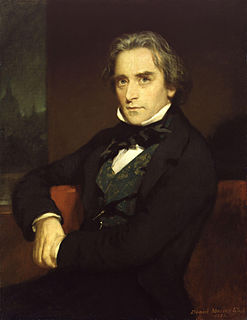A Quote by Daniel Webster
The Bible is a book of faith, and a book of doctrine, and a book of religion, of special revelation from God; but it is also a book which teaches man his own individual responsibility, his own dignity, and his equality with his fellow - man.
Related Quotes
Our children should be indoctrinated in the principles of the Gospel from their earliest childhood. They should be made familiar with the contents of the Bible, the Book of Mormon and the Book of Doctrine and Covenants. These should be their chief text books, and everything should be done to establish and promote in their hearts genuine faith in God, in His Gospel and its ordinances, and in His works.
You will want a book which contains not man's thoughts, but God's - not a book that may amuse you, but a book that can save you - not even a book that can instruct you, but a book on which you can venture an eternity - not only a book which can give relief to your spirit, but redemption to your soul - a book which contains salvation, and conveys it to you, one which shall at once be the Saviour's book and the sinner's.
Of all man’s instruments, the most wondrous, no doubt, is the book. The other instruments are extensions of his body. The microscope, the telescope, are extensions of his sight; the telephone is the extension of his voice; then we have the plow and the sword, extensions of the arm. But the book is something else altogether: the book is an extension of memory and imagination.
The God in whose hands are all our days and ways, did cast into my hand (one day) a book of Martin Luther's ; it was his Comment on the Galatians! ... I found my condition in his experience so largely and profoundly handled, as if his book had been written out of my heart ... I do prefer this book of Martin Luther upon the Galatians, excepting the Holy Bible, before all the books that ever I have seen, as most fit for a wounded conscience.
The Bible is one long story of God meeting our rebellion with His rescue, our sin with His salvation, our guilt with His grace, our badness with His goodness. The overwhelming focus of the Bible is not the work of the redeemed but the work of the Redeemer. Which means that the Bible is not first a recipe for Christian living but a revelation book of Jesus who is the answer to our un-Christian living.
I can tell by my own reaction to it that this book is harmful." But let him only wait and perhaps one day he will admit to himself that this same book has done him a great service by bringing out the hidden sickness of his heart and making it visible.— Altered opinions do not alter a man’s character (or do so very little); but they do illuminate individual aspects of the constellation of his personality which with a different constellation of opinions had hitherto remained dark and unrecognizable.
Because he did not have time to read every new book in his field, the great Polish anthropologist Bronislaw Malinowski used a simple and efficient method of deciding which ones were worth his attention: Upon receiving a new book, he immediately checked the index to see if his name was cited, and how often. The more "Malinowski" the more compelling the book. No "Malinowski", and he doubted the subject of the book was anthropology at all.
Walden is the only book I own, although there are some others unclaimed on my shelves. Every man, I think, reads one book in his life, and this is mine. It is not the best book I ever encountered, perhaps, but it is for me the handiest, and I keep it about me in much the same way one carries a handkerchief - for relief in moments of defluxion or despair.
Chrysostom, I remember, mentions a twofold book of God: the book of the creatures, and the book of the scriptures. God, having taught us first of all by his works, did it afterwards, by his Words. We will now for a while read the former of these books; 'twill help us in reading the latter. They will admirably assist one another.
As I walked through the wilderness of this world, I lighted on a certain place, where was a den; and I laid me down in that place to sleep: and as I slept I dreamed a dream. I dreamed, and behold I saw a man clothed with rags, standing in a certain place, with his face from his own house, a book in his hand, and a great burden upon his back. I looked, and saw him open the book, and read therein; and as he read, he wept and trembled: and not being able longer to contain, he brake out with a lamentable cry; saying, 'What shall I do?'










































